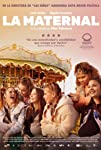Eye For Film >> Movies >> La Maternal (2022) Film Review
La Maternal
Reviewed by: Amber Wilkinson

It seems to have been a year of good performances from young actors, from carefully calibrated turns from newcomers Eden Dambrine and Gustav De Waele in Lukas Dhont’s Close to Frankie Corio’s natural chemistry with older star Paul Mescal in Charlotte Wells’ Aftersun. At the top of the list you can put teenager Carla Quílez for her sometimes fierce, sometimes fragile performance at the heart of Pilar Palmero’s docufiction drama about the challenges of teenage motherhood.
Fourteen-year-old Carla (Quílez) is a handful. Riding like the wind on her bike alongside her mate (Jordan Angel Dumes) their idea of fun is to break into middle-class homes and trash the place. Years ago she might have been described as something of a latch-key kid, although she’s as likely to be told to make herself scarce by her mum Penelope (Angela Cervantes) as she is to be left home alone. The pair, although showing moments of closeness, have a relationship that thrums with tension - it’s evident that Penelope had Carla when she was a teenager herself and that this has made things quite tough for both of them.

When Carla discovers she is pregnant, the action shifts away from the rural diner where her mum tries to keep their lives afloat to a group home in the city, where teenage mums are supported through their pregnancy and on into the first years of motherhood. The film already had a raw realism, with the energy of the likes of Andrea Arnold and Celine Sciamma, but the second act brings it even closer to reality as the youngsters in the home, and those who run it, are playing ficitonalised versions of themselves.
The tone is set by a group session in which the girls relate their roads to pregnancy, a mostly heartbreaking catalogue all the more affecting for the clear-eyed way it is presented. Nothing in Palermo’s film is sugar-coated, although a sweetness runs through it as we see how those who are no more than children themselves are thrust into the role of caring for their own babies. Carla is a punchy protagonist and Palermo and Quilez allow her to retain her complexity.
The challenges of young motherhood are here, particularly the wakefulness of babies and the frustrations that can bloom when they refuse to stop crying - “He’s trying to f**k with me,” Carla declares in exasperation.
These moments are presented through the ensemble lens of the home, rather than just Carla’s experience, which gives them a universal quality and stops the film slipping into cliche. It also shows how important the shared experience is and with it the building of solidarity. Visits from Penelope also nudge us to remember that Carla’s mother had to go through this all on her own. Cervantes brings an emotional rawness to Penelope as her relationship with her daughter is gradually allowed to recalibrate thanks, at least in part, to the second-hand support she is receiving by Carla being where she is.
Palermo quietly celebrates the sense of adoptive family that blossoms in these spaces even as she notes how difficult it often is for the youngsters to sustain the weight of their responsibilities in ways that are empathetic and non-jugemental. This is not about the whys and wherefores of how these things have happened but the complexities of dealing with the end result once they have. The love here may be of the tough variety, but that, you suspect, makes it all the more durable in the long term.
Reviewed on: 21 Nov 2022
















